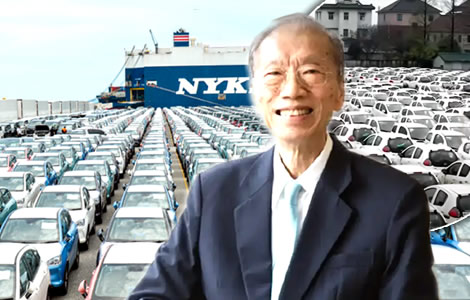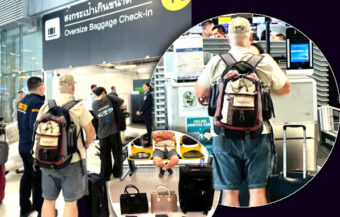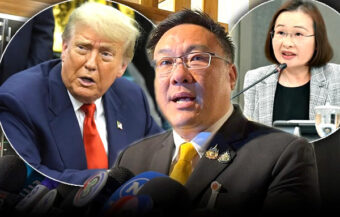The Thai government faces urgent demands to support the critical ICE car manufacturing sector amid an influx of unsold Chinese EVs. Over 10,000 cars clog Laem Chabang Port as EV sales plummet, pushing local manufacturers and dealerships to the brink.
The government is facing urgent calls to provide stimulus to the kingdom’s valuable and critical ICE (Internal Combustion Engine) car manufacturing sector. It comes as an invasion of Chinese-made EVs being dumped on the Thai market has resulted in a buildup of over 10,000 unsold cars at Laem Chabang Port in Chonburi. This is the result of a failure of EV cars to continue the surge seen at the end of 2023. In the meantime, traditional automotive makers who support the country’s parts industry are on a knife’s edge. Sales of EV cars plummeted in Thailand in February 2024, and in May were down year on year.

However, they are up 33% for the year so far while being subsidised by the Thai government at ฿100,000 per car. Nonetheless, this week an anonymous source within the Federation of Thai Industries (FTI) stated that sales momentum even in China was declining for such cars, which are now being dumped on the rest of the world.
A senior Thai motor industry executive has called on the government to urgently consider stimulus measures to assist the ailing internal combustion engine (ICE) car manufacturing sector in Thailand.
The sector is at a historic low with large manufacturers closing and dealerships throwing in the towel.
10,000 cars, mainly from China and EV vehicles are costing ฿60 million a month to store as they cannot be sold on a market that suddenly collapsed in February
The call comes as unsold Chinese EV cars make up the vast majority of the 10,000 vehicles presently sitting at Laem Chabang Port in Chonburi.
The unsold cars have led importers to put a brake on orders from the Chinese mainland.
In the meantime, the crisis in the automotive industry, which has only just begun to bite, is set to get worse. Presently, dealerships are not only unable to accept further orders from factories but are also closing down.
The turmoil in the industry has seen Suzuki Motors in Rayong announce that it will cease production in Thailand sometime in 2025. At the same time, Subaru will halt its production of cars by the end of the year.
Nonetheless, according to Dr Saroj Vasuwanich, formerly a president of the Eastern Industrial Council, things could be a lot worse.
Established firms such as Toyota hanging in there by cutting overtime and redeploying their workers to multifunction tasks as they hope for an uplift
He said established firms like Toyota have cut overtime and are trying to improve efficiency even in the short term. This includes deploying workers to multi-function tasks. The alternative to that would be massive layoffs.
Dr Saroj said that presently there was only a 25% fall in production. However, if the current trend continues, the situation might become far more serious.
The projected output of cars this year of 1.9 million now appears untenable. The manufacture of pickup trucks in Thailand was down 45.94% for the first four months, similarly 5.03% for passenger cars.
Significantly, the exports of ICE (Internal Combustion Engine) cars are not as adversely impacted. For instance, in April, 68.72% of cars produced, or 71,928 units were exported.
This represented a 5.92% increase. However, for the first four months, exports of cars were down overall by 2.93% at 345,608 units.
Falling purchaser power particularly felt in the domestic vehicle sales market in Thailand this year. Driven by tighter credit and certainly by EV car confusion
The problem lies in the disruption within the domestic market caused by falling consumer purchasing power, tight credit restrictions, and confusion over the impact of EV cars.
For instance the future secondhand value of ICE (Internal Combustion Engine) cars and EV models.
In short, domestic demand for all cars has cratered.
In the meantime, a source within the automotive sector at the Federation of Thai Industries (FTI) pointed to dumping by China. The source, who requested anonymity, said that all markets worldwide were being disrupted by the same activity.
Thailand’s EV car vision buckles as World markets and canny drivers at home take stock of what is on offer
Disturbing questions that must be confronted over Thailand’s reeling economy are China and EV cars
Drivers in Thailand are turning their backs on the EV hype. Sales in April were down further at 18.4% from March
PM Srettha blames stock market fall on politics but the trend is linked to fundamental economic decline
‘Every market has seen an influx of Chinese-made cars, especially EVs, as the mainland market can’t absorb the total output, prompting Chinese automakers to ship them out, with Beijing providing support,’ the source disclosed.
Evidence that Chinese EV Sales numbers are misleading
This is supported by disturbing reports of Chinese officials inflating records, suggesting far more EV cars are sold.
In short, evidence that registrations of EV cars in China are not a reflection of market reality. It is now widely accepted that the same tactics have for decades been used in relation to China’s GDP data.
At this time, economists openly discount Chinese GDP data and economic projections. Certainly previously senior Chinese officials, at the very top, admitted this was the case.
Property market collapse in China and a Chinese economic recession is the key threat to Thailand
China could be an economic time bomb sitting on Thailand’s doorstep as Evergrande collapse nears
Indeed, this is how the Chinese property disaster occurred. The result was a collapse in the market and millions of unsold properties across the Communist country.
Moreover, there is authenticated evidence that EV cars registered in China in 2021 were left sitting in fields. This includes one field with 10,000 registered but unsold EV cars linked to one of its leading EV car brands.
The photographs were taken on May 3rd 2021 and have been fact-checked by international press agencies including USA Today.
Certainly, they were afterwards misused by anti-EV campaigners in France and the United States.
Reports from China also suggested a slowing of momentum in the growth of EV sales or certainly a need for manufacturers to export or dump excess vehicles
In addition, the FTI source claimed that EV sales in China are also now facing a decline. The exception was the BYD car company, a key importer of EV cars in Thailand.
‘But the situation in Thailand is worse than in those developed markets as the economy is floundering and political uncertainties are emerging, which both hurt consumer confidence,’ said the anonymous FTI source.
In the meantime, some Chinese manufacturers have moved to the kingdom based on government incentives. However, these production facilities are not outsourcing parts manufacturing as Japanese ICE (Internal Combustion Engine) firms had done previously.
The reason for this is simple. Thai suppliers cannot compete. They are up against massive Chinese manufacturing entities with economies of scale. At the same time, the Chinese have trade secrets and intellectual property that they are reluctant to share.
Federation of Thai Industries (FTI)’s auto section growing increasingly concerned about the situation emerging in 2024 including slow government spending
The Federation of Thai Industries (FTI) has initiated a trade survey across the country’s sprawling automotive parts sector. In short, it too is facing a catastrophe if the current collapse continues without decisive action.
At the same time, Surapong Paisitpatanapong of the Federation of Thai Industries (FTI) called on the government to support the national car sector as a matter of urgency. He said his body expected economic stimulus measures.
There are also questions about the slow disbursement of the government’s 2024 budget, particularly in relation to capital investment.
‘The government has already initiated measures to boost the real estate market in April. It needs to urgently come up with measures to stimulate auto purchases, particularly internal combustion engine vehicles and pickup trucks, which use over 90% locally produced parts. This sector is interconnected with many other industries, similar to real estate,’ Mr Surapong said. ‘Increased production in these industries would lead to more employment opportunities, higher public employment, and increased revenue from excise, value-added, and income taxes for the government.’
Wider EV agenda from the government appears far too ambitious and unrealistic at this time. Certainly, it appears to be damaging the country’s auto sector
In the meantime, sales of EV cars in Thailand declined in May 2024 year on year with 2023. Car industry analysts believe that the government is unlikely to achieve its medium target of 130,000 EV cars sold. Indeed, this is part of a wider agenda by the government.
It wants to see 30% of car manufacturing in Thailand tied with EVs by 2030. Meanwhile, it is also projected that the country will produce 725,000 zero-emission cars.
At length, to achieve this, the government under its EV 3.5 incentive is paying a subsidy of ฿100,000 per imported vehicle.
At this time, 10,000 cars are being stored, taking up a space of 200,000 square metres. This is at Laem Chabang Port in Chonburi. The average car takes up 20 square metres. With storage costs running at up to ฿100 per square metre, that’s ฿2,000 per car per day.
฿60 million a month to store unsold EV cars piling up at Laem Chanbang Port as firms rush to cancel imports. Sales of EV cars plummeted 74% in February
Certainly, as we speak, car importers at Laem Chabang, most of them linked with EV vehicle firms in China, are faced with a ฿2 million a day storage charge. That is ฿60 million a month. Indeed, the problem is getting worse as they struggle to find storage space for a growing inventory of unsold cars.
Sales of EV cars in Thailand plummeted in February 2024 by a shocking 74%. Afterwards, they failed to recover and are running at levels similar to or below last year. In the meantime, demand for EVs worldwide is declining.
Mainstream consumers are switching off when faced with a litany of issues. These run from range anxiety to potential battery failure and significantly lower resale value.
Thai government still paying ฿100,000 per car subsidy
Governments worldwide are being faced with a rejection of their climate change-driven EV mobility vision by the consumer market.
Furthermore, the cars themselves have become embroiled in the trade war between the United States, its Western allies and China. Certainly, this is growing fiercer.
Certainly, the position of the Thai government is even more complicated.
Faced with the dumping of Chinese-made EVs on its market, the kingdom is offering generous subsidies for cars that are facing tariff barriers elsewhere.
Government so far has failed to effectively impose a 7% VAT tax on cheaper Chinese products flowing into Thailand despite a promise to do so in February
Similarly, Thailand’s small and medium-sized manufacturing sector is facing a similar dumping threat at the hands of China. It comes as new free market trade pacts came into effect in October 2021.
In response, the government of Srettha Thavisin promised action.
In February 2024, faced with public outcry over Chinese firms stealing the market for elephant pants worldwide, it decided to reimpose VAT on Chinese imported products under ฿1,500 in value.
Elephant pants should be a Thai success story. Instead, it is a story of economic policy failure as manufacturing slips
However, the government has moved very slowly in implementing this measure. The cabinet only approved it earlier this month.
Nonetheless, it is not yet in effect and is only scheduled to be implemented on December 31, 2024.
Join the Thai News forum, follow Thai Examiner on Facebook here
Receive all our stories as they come out on Telegram here
Follow Thai Examiner here
Further reading:
Lack of coherence in government policy is the root cause of Thailand’s massive economic problems
Disturbing questions that must be confronted over Thailand’s reeling economy are China and EV cars
First-quarter GDP growth surprises analysts based on higher tourism and consumer spending growth
Central bank holds interest rates. Economy will grow 2.6% in 2024 as Srettha pushes home ownership
Economy unlikely to grow in first quarter as Thai manufacturing crumbles. Hard choices ahead
New Finance Minister expected in April as economic malaise deepens with downgrades in GDP growth


















